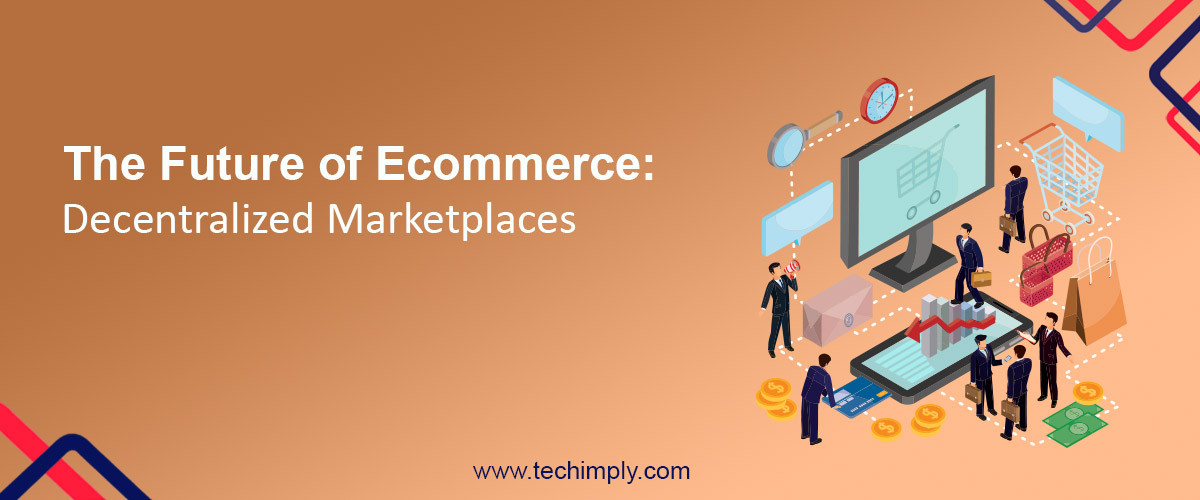The world of e-commerce has grown rapidly over the past few decades, but it has also faced some challenges, including issues related to trust, security, and transparency. Traditional e-commerce platforms rely on central authorities to manage transactions and store data, leaving customers vulnerable to fraud, data breaches, and other security risks. To address these challenges, a new model of e-commerce is emerging: decentralized marketplaces. These platforms use blockchain technology to create a trustless, transparent, and secure environment for online buying and selling goods and services. In this article, we will explore the potential of decentralized marketplaces to transform the e-commerce industry and usher in a new era of trust and transparency.
What Is A Decentralized Marketplace?
A decentralized online marketplace allows buyers and sellers to conduct transactions without a central authority or intermediary. Instead, trades are executed using blockchain technology, a decentralized, peer-to-peer network that uses cryptography to secure and verify transactions.
In a decentralized ecommerce marketplace, buyers and sellers interact directly, and transactions are recorded on a public ledger, which all participants in the network maintain. This eliminates the need for a central authority, such as a bank or e-commerce platform, to oversee transactions, reducing fees and increasing transparency and security.
Decentralized marketplaces are often used for buying and selling digital goods, such as cryptocurrency, but they can also be used for physical goods and services. Some examples of decentralized marketplaces include OpenBazaar, Origin Protocol, and Soma.
Benefits Of Decentralized Marketplaces
Decentralized marketplaces, also known as peer-to-peer marketplaces, offer a range of benefits over traditional marketplaces. Here are some of the key benefits of decentralized marketplaces:
1. Lower Fees
Decentralized marketplaces often charge lower fees than traditional marketplaces, as they do not have to pay for intermediaries such as payment processors or shipping companies.
2. Increased Security
Decentralized marketplaces use blockchain technology to ensure secure and transparent transactions. Fraud and other security issues are reduced as a result.
3. Greater Control
Decentralized marketplaces give buyers and sellers more control over their transactions, as they are not reliant on a centralized authority to mediate disputes or oversee transactions.
4. Privacy
Decentralized marketplaces often offer greater privacy than traditional marketplaces, as they do not require users to provide personal information such as their name or address.
5. Global Reach
Decentralized marketplaces can be accessed from anywhere globally, making buying and selling goods and services across borders easier.
6. Innovation
Decentralized marketplaces are often at the forefront of innovation, as they can experiment with new technologies and business models.
Decentralized marketplaces offer a more decentralized, secure, and innovative way of trading goods and services, benefiting buyers and sellers. As blockchain technology evolves, decentralized marketplaces will become even more efficient, user-friendly, and appealing to users.
Challenges Of Decentralized Marketplaces
While decentralized marketplaces offer a range of benefits over traditional marketplaces, several challenges come with operating in a decentralized environment. Here are some of the key challenges of decentralized marketplaces:
1. Lack Of Regulation
Decentralized marketplaces often need to be more regulated, making it difficult to ensure that transactions are fair and secure.
2. Limited User Base
Decentralized marketplaces are often less well-known than traditional marketplaces, limiting their user base and making it more difficult to attract buyers and sellers.
3. Technical Complexity
Decentralized marketplaces often require a greater degree of technical knowledge than traditional marketplaces, which can make them less accessible to users who are not familiar with blockchain technology.
4. Lack Of Trust
Decentralized marketplaces rely on the trust between buyers and sellers, which can be difficult to establish in a decentralized environment without a central authority to mediate disputes.
5. Scalability
Decentralized marketplaces can be less scalable than traditional marketplaces, as they rely on blockchain technology and can be slower and more resource-intensive than conventional systems.
While decentralized marketplaces offer a range of benefits, they also face several challenges that can make operating in a decentralized environment more difficult. As blockchain technology evolves, these challenges will likely become easier to address, and decentralized marketplaces will become even more efficient, user-friendly, and appealing to users.
The Future Of Decentralized Marketplaces
Blockchain technology continues to evolve and become more widely used, which bodes well for decentralized marketplaces. Here are some of the key trends that are likely to shape the future of decentralized marketplaces:
1. Interoperability
In the future, decentralized marketplaces will become more interoperable, meaning they can communicate and share information more easily. This could create a more unified and connected ecosystem of decentralized marketplaces, making it easier for buyers and sellers to find what they want.
2. Increased Scalability
As blockchain technology continues to evolve, decentralized marketplaces are likely to become more scalable, which could help to address one of the key challenges facing these platforms. New solutions, such as layer-two scaling solutions or sharding techniques, can improve the performance of decentralized marketplaces and allow them to handle more transactions.
3. Greater Adoption
As more people become familiar with blockchain technology, decentralized marketplaces will become more widely adopted. This could increase their user base and make them a more attractive option for buyers and sellers.
4. Expansion Into New Markets
Decentralized marketplaces will likely continue expanding into new markets, including healthcare, education, and real estate. These markets could benefit from the increased security, transparency, and efficiency of decentralized marketplaces.
5. Evolution Of Business Models
Decentralized marketplaces will likely continue experimenting with new business models, such as tokenization and decentralized autonomous organizations (DAOs). These models could create new incentives for buyers and sellers and make decentralized marketplaces more sustainable over the long term.
Overall, the future of decentralized marketplaces looks bright as blockchain technology continues to mature and become more widely adopted. While challenges remain, such as scalability and regulatory issues, decentralized marketplaces will likely play an increasingly important role in the global economy in the coming years.
Conclusion
The future of decentralized e-commerce marketplaces powered by Web3 technology is bright as blockchain technology continues to evolve and become more widely adopted. These platforms offer a range of benefits, including increased security, greater control, and lower fees for buyers and sellers. As more people become familiar with blockchain technology and decentralized marketplaces, these platforms will become more widely adopted, helping to create a more efficient and transparent global e-commerce marketplace.
To take advantage of this emerging trend, businesses can consider investing in Web3 ecommerce platform development to tap into the growing demand for decentralized ecommerce solutions. Whether you are a buyer or seller, decentralized ecommerce marketplaces can offer a better way to transact online.



.png)


